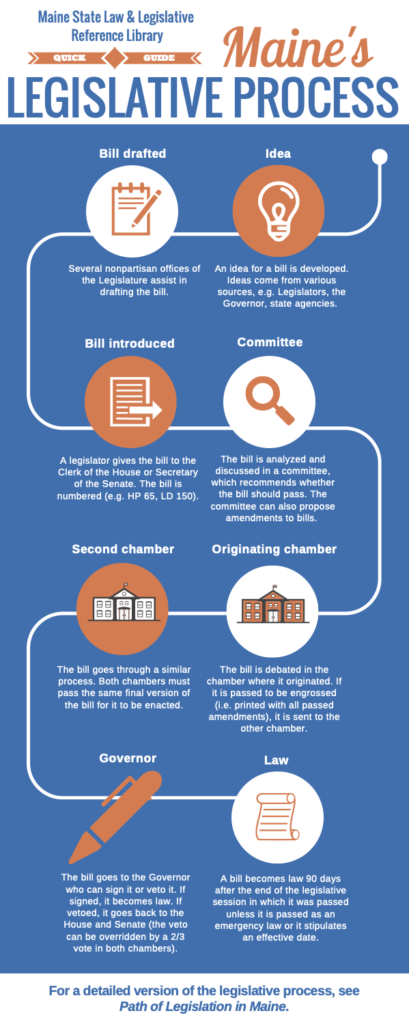Follow That Bill
A Quick Primer on Pending Legislation
The general legislative web site is: http://www.maine.gov/legis/siteguide/
There you can find contact info for legislators, membership of committees, bill histories and other assorted information. You can check for bills sponsored by number or by sponsor. You can’t tell a lot from the titles only, so once the bills are printed and become LDs, they’re listed at: http://www.mainelegislature.org/legis/bills/bills_125th/billtexts/
“HPs” are “House Papers” and “SPs” are “Senate Papers,” but when a bill is printed it becomes an “LD” or “Legislative Document.” The current budget document, for instance, is LD 1043 -it’s about 600 pages long, so don’t download it!
The public hearing & work session schedule for all the committees is found at: http://www.maine.gov/legis/senate/Hearings.html The detailed list is issued on Thursdays and is updated several times a week. You can be added to the listserve to receive the weekly schedule with updates by going to that part of the above web site where it says “Join Our Mailing List.”
When you see a bill you’re interested in and want to know what it says, who sponsored it and what the status is, click on: http://www.mainelegislature.org/LawMakerWeb/search.asp and fill in the LD number. If you do not have the LD number, click on “Advance Search” for further assistance.
To listen in on House debate, Senate debate and any Committee hearings or work sessions, click on: http://www.maine.gov/legis/audio/ You can get video streaming of the House & Senate, but not of the Committee meetings.
A unanimous committee report generally dictates the fate of the bill. A unanimous ought not to pass (or “ONTP”) places the bill in the dead file and it will not be debated on the floor of the House or Senate. If only one member votes against the majority of the committee, the bill can still be debated on the floor. A unanimous ought to pass (“OTP”) or ought to pass as amended (“OTP-AM”) means the bill will likely pass under the hammer in the House and the Senate.
If a fiscal note is attached to it during the committee deliberations and the bill passes both the House and the Senate, the bill will then end up on the “Appropriations Table” and will not be finally enacted until it is funded or amended in some fashion so as to strip the fiscal note.
When a bill becomes a law it becomes a “chapter law,” with a title such as “PL 2009 ch.23,” for instance (“PL” meaning “Public Law.”) and then part of the Maine Revised Statutes. These may be found at: http://www.maine.gov/legis/ros/Publications.htm and the entire body of Maine statutes, listed by Title, are at: http://www.mainelegislature.org/legis/statutes/


